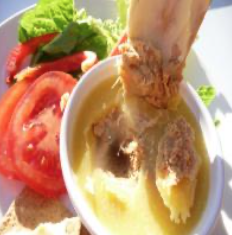So simple but so delicious - potted fish
- Jan 29, 2022
- 6 min read
"There are restaurateurs and cookery journalists who like to call confections such as haddock and kipper paste by the name of pâté. I find this comical and also misleading." Elizabeth David

When David announced to his family that we were getting married, I was invited to meet some of his very daunting aunts. On one of these occasions we were invited to a dinner
in one aunt's posh St. John's Wood flat. The evening did not start well, as when asked to show my engagement ring, I had to say there was none. Well we were very poor and had decided not to be so extravagant. Looking back I now see this as a symptom of David's really poor childhood and subsequent reluctance to spend on luxuries. I would have been happy with a bit of costume jewellery, now that I think about it. But at the time I did not mind. And we did buy a top of the range wedding ring. Anyway this did not go down well. There was a very awkward silence for a moment or two. However, we proceeded to dinner, the first course of which was a kipper paste. It was superb and when I found that the uncle had made it I asked him how, because I wanted to have a go. I think this might have lifted me up a notch in estimation thankfully, for we had a small conversation about the whole thing. The main thing though was that as Uncle Cecil described it it was so very simple, I vowed to give it a go.

And I did, for I found the recipe in Jane Grigson's Good Things - Uncle Cecil may even have told me this is where the recipe was from. Now I had always despised kippers. I loathed the smell. My mother used to cook them sometimes for breakfast. I'm not sure who for. Probably she and my father. But, like whisky, I couldn't get past the smell. So I was very surprised to be blown away by their unique flavour in that kipper paste. You can find the recipe for Kipper paste on the Neil Cooks Grison website. However his recipe is not quite as simple as Jane Grigson's. He has messed with it.
Last night, however, I made smoked trout paste, from her kipper recipe with smoked trout rather than the kippers, which are now rather more difficult to find. To be honest it is better with the kippers, but smoked trout is more than an adequate substitute. It has a rather more subtle taste, but still delicious. And even though Elizabeth David said fish pastes don't go with biscuits, that is what we had it with - as you can see from the picture at the top of the page. I made it because I fancied it really, and I had a smoked trout in the fridge. I didn't use the whole trout though, just about a third of it I guess. And I just guessed at the amount of butter. But that's the thing about it, it is such a forgiving thing and one that you can indeed mess with.
I will give the basic recipe here - In a food processor blend your flaked smoked fish, with the same weight in melted butter. Add chilli powder to taste, and lemon juice to taste. Blend to a paste. Put into a suitable dish and refrigerate until set. Yum, yum, yum. It took all of 5 minutes, not counting the washing up.
As I said, you can do virtually the same thing with any kind of smoked fish, any kind of tinned or fresh fish come to that, although, of course you will have to cook fresh fish first. It's also a useful thing to do with any leftover fish you have hanging around. Which I do in fact. I should have added it to the trout.
As for the kippers, I liked them so much in this paste, that I also tried her Kipper flan which is also delicious. So every now and then I do look out for them. They have them tucked away sometimes in unexpected places.
"The good kipper is one of this country's worthy contributions to fine food." Jane Grigson
But back to potted fish. Elizabeth David is right - you will sometimes find recipes for them described as pâtés. You will also find variations that include cream. Jane Grigson herself suggests a tablespoon of cream for her kippers as an optional extra. Some go further and add other creamy things, like cream cheese, yoghurt and crème fraïche but I think you are really almost into dip territory by then. Curtis Stone's Smoked trout spread is a rather lovely looking example of this and I also found a recipe for Scottish kipper pâté - yes pâté which included whisky of all things, although it does look rather like Jane Grigson's original recipe:
No a potted dish is, at it's simplest fish, or meat, shredded or flaked and mixed with melted butter plus other flavourings - lemon, mace, nutmeg, capers, various herbs, chilli, etc. Then most seem to think that you should cover them with clarified butter to preserve them. Personally I think they get eaten up well before they are going off. And a couple of times, particularly with the kipper version, I have found that as the blitzed mixture sets in the fridge the clarified butter rises to the top anyway. Which it didn't yesterday as you can see. For myself I am happy to leave it out, as I don't really like the taste of clarified butter for some reason - or perhaps it's the texture.
Potted shrimps - another classic English dish made from brown shrimps which come from Morecambe Bay in Lancashire, but of course, you can make them with Australian prawns. With potted shrimps though you don't blitz the shrimps - cooked of course - you just mix them with the butter. I found three versions online - Potted shrimps from James Martin, Potted shrimp with mace butter from Josh Eggleton and Potted prawns from our own Maggie Beer.

Hugh Fearnley-Whittingstall has a go at Potted crab, but looking at the picture I think we are now veering into the various rillettes versions.
Now rillettes are a French dish of cooked shredded meat mixed with various spices and butter but never fish. However, in recent years I have noticed that salmon rillettes especially are quite the thing. And somewhat more complicated than my simple smoked fish paste, but pretty nice nevertheless - Salmon rillettes with chives and shallots from Daniel Gritzer of Serious Eats; Salmon rillettes from delicious. and Salmon rillettes from Danielle Alvarez
Fish paste in jars is not the same as potted fish. Its a rather more concentrated concoction, and it tends to be something you buy in jars, and spread very thinly in sandwiches like vegemite, or use it as a flavour booster to other things. I remember we had fish paste at home and had it in sandwiches. I vaguely remember the taste, and liking it. Which one was it? Bloater I think. Bloaters are herrings lightly smoked I think. Peck's was one of the main producers of these fish pastes - Anchovette was their most famous and you can still get it - even here in our local supermarkets, although its now American owners, and French makers have apparently changed the recipe to much criticism. Then there is Shipham's salmon and also bloater paste, and The Gentleman's Relish otherwise known as Patum Peperium:
"Now, Patum Peperium is not to everyone’s taste – saying it is piquant would be doing it a gross injustice – it is very fishy, very salty and very spicy, so some may consider it totally foul." British Food: a History
Well lot's of people consider fish pastes and fish sauces foul. But the again lots of people don't.
"Meat and fish pastes are still around. They exist in a weird little timewarp of forgotten but much-loved Victorian prepared foods along with corned beef, custard powder and tinned meat pies." Tim Hayward - The Guardian
So all very English and until you get into some of those more extreme jarred fish pastes, all very delicious. But let's not forget the French anchoïade which is more akin to the relishes of course, and their Brandade de moru - a salt cod concoction which has the consistency of those rillettes, and of course, Taramasalata from the Greeks. I tried to find whether other countries have similar things - pounded fish mixed with butter and covered with butter, but so far have not found anything. I don't doubt that the chefs of today are experimenting with such things.
























Comments